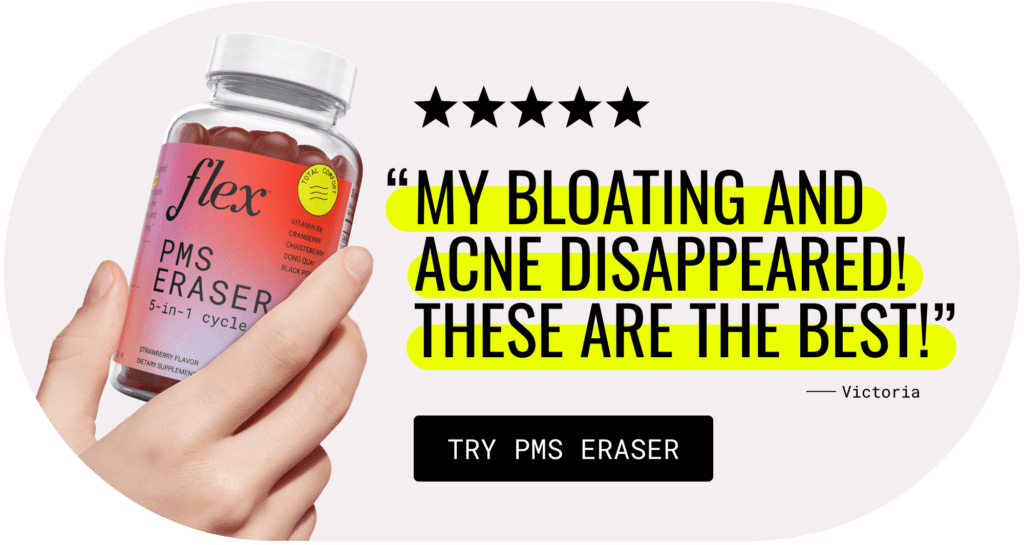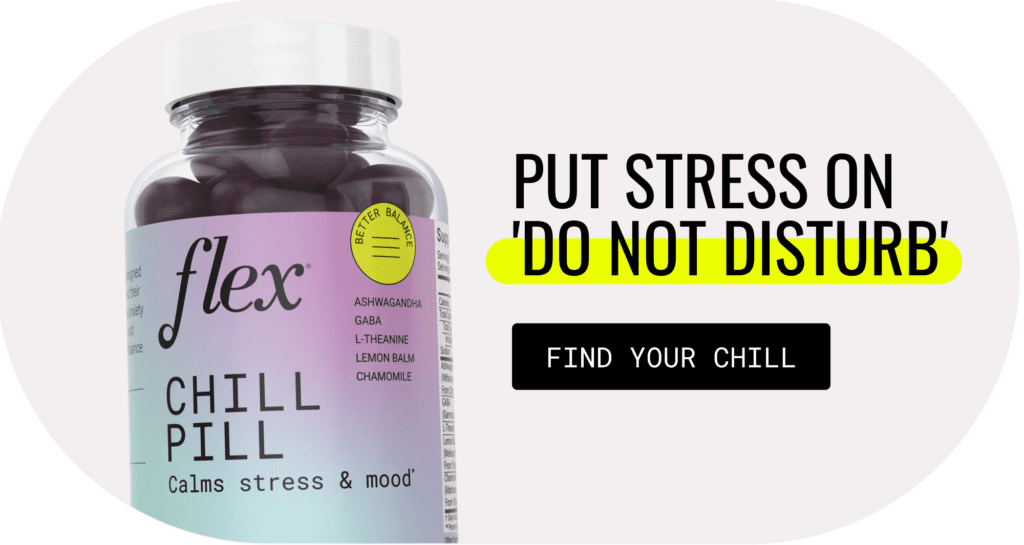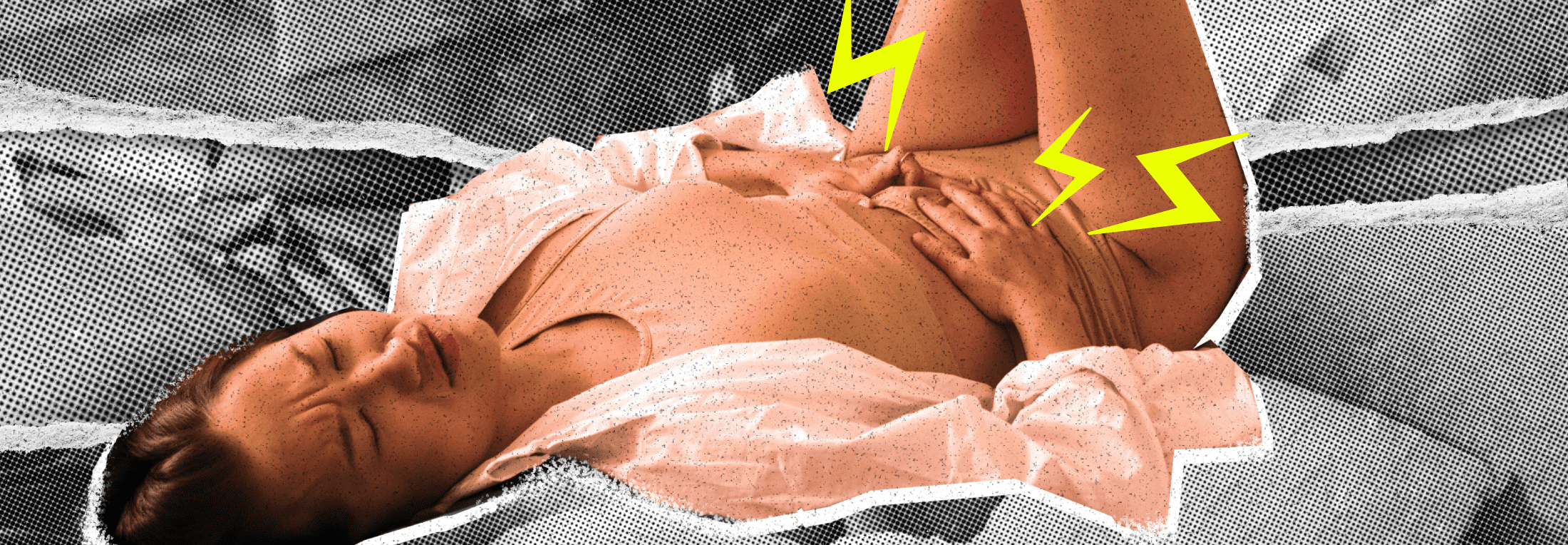PMS: How to deal with the symptoms, naturally
Cramping, swelling, and bloating… OH MY!
POV: You woke up feeling refreshed and ready to tackle your daily to-dos. You head to Target to wreak havoc on the new seasonal home decor with your Starbucks drink in hand when you immediately feel a series of shooting pains stemming from your abdomen.
Panicked thoughts begin racing through your mind: Is this a questionable bowel movement? Could the milk in my soy latte have expired? Did I forget to take my birth control?
You then remember what day it is and pull out your phone in search of your handy period tracker app. It all suddenly clicks: Your period starts any day now…
“It’s me, hi! I’m the problem, it’s me!”
-PMS, probably
The TL;DR on PMS signs and symptoms
The average menstruator will have 450 periods in their lifetime. With this naturally-recurring interval, you could likely write a comprehensive TED Talk on the wide array of symptoms of PMS experienced throughout menstrual cycles: the cravings, bloating, mood swings, the hormonal headaches, etc. Not to mention, your specific routine when it comes to period care: your heavy-flow days, what helps with period cramps, and which menstrual product brands provide you with the utmost control over blood and, of course, comfort.
While there is no magic potion or cure-all to PMS relief, many symptoms are shared between menstruators who experience similar sentiment each month. It is important to note that not all remedies require medical, scientific, or evidence-backed research to be considered successful. The best way to navigate PMS is by figuring out your own unique patterns and which solutions work best for keeping your cool as your reproductive system is working OT.
Keep (extra) calm and read on to get the deets on PMS discomfort you may feel before, during, and after your period, and what actually helps with those pesky period cramps.
Cramping, bloating & other period pain
Two of the most common (yet extremely annoying) PMS symptoms reported in a recent Flex survey include uterine cramping and bloating in the abdomen. Unfortunately, a dip in estrogen levels may inevitably cause a temporary dip in self-confidence (thanks, hormone changes!). With that said, over 80% of all menstruators will experience some form of premenstrual cramping in their lifetime ranging from slightly annoying to “calling in sick.”
Symptoms of your period coming can also include PMS headaches, as well as premenstrual breast pain. Both headaches before period and breast soreness are typically triggered by… you guessed it: hormonal fluctuations (falling estrogen and progesterone levels)!
But, exactly why do my breasts hurt before my period? If this sounds like you, read on. Premenstrual breast swelling and soreness can occur when the sudden change in hormone levels cause breast ducts and lymph nodes swelling, contributing to the added tenderness of breast tissue and the milk duct growth. Most importantly, as your body prepares for ovulation, it’s vital to also nurture it by practicing healthy remedies that can also aid in a more comfortable cycle.
If you notice breast symptoms that are not related to your menstrual cycle, or if you are breastfeeding and observe signs of infection or discover lumps that persist regardless of your cycle, contact your provider to get a breast exam.
THE FIX: For ditching PMS discomfort
- Massage your skin with essential oils
- Ditch inflammatory foods (meats, oil, alcohol, sugar, salts)
- Incorporate magnesium or magnesium supplements in your diet
- Wear a comfortable bra
- Curl up with a heating pad
- Switch to Flex Disc or Flex Reusable Disc
ALSO TRY: PMS Eraser
Relief is calling! Our 5-in-1 powerhouse blend of vitamin B6, cranberry, chasteberry, dong quai, and black pepper extract is carefully formulated to help tame your most dreaded PMS symptoms and feel in control all month long. No pills, no water, just the good stuff!


Stress, anxiety & behavioral changes
It is a widely known fact that hormones are a real pain in the… you know. If you experience higher levels of stress and anxiety as your menstrual period approaches, these changes in your mood are likely because of decreased levels of progesterone and estrogen.
Other side effects of hormonal changes leading up to the dreaded “Day 1” include hormonal acne, as well as food cravings or changes in your diet.
In turn, higher levels of cortisol due to stress can interrupt normal hormone production, resulting in abnormal menstrual cycles, whether that be more severe symptoms or a completely missed period. Think of this as your body’s way of expressing its unreadiness for ovulation and pregnancy.
THE FIX: For soothing common stressors
- Maintain regular physical activity / exercise (a minimum of 30 minutes of cardio daily and weight lifting a few times a week)
- Practice meditation
- Keep a journal of your thoughts
- Limit (or stop) caffeine and alcohol intake
- Prioritize getting a good night’s sleep
ALSO TRY: Chill Pill
Kick back and actually R.E.L.A.X! with our natural raspberry-flavored gummies packed with ashwagandha, GABA, L-theanine, lemon balm, and chamomile to melt daily stressors and maintain a sense of zen-like balance throughout your entire cycle.


Symptoms days before your period, during & BEYOND
Not to be the bearers of bummer news, but cycle-related symptoms don’t just occur the week leading up to your period. People can experience discomfort weeks before their period begins and after it ends. In fact, on some occasions, your period can even play a role in some other common bodily issues.
Sleep troubles
Whether it be chronic fatigue as your body prepares to ovulate or trouble sleeping due to the physical effects of menstruation, 45% of menstruators reported regularly experiencing issues with sleep in a recent Flex study.
Here’s the sitch: Our cycles are associated with changes in our circadian rhythms and sleep structure. Menstruators can run into poor sleep due to reasons like having to change a tampon every 4-6 hours or disturbances caused by painful cramping.
THE FIX: For better sleep
- Keep a consistent schedule
- Limit caffeine and alcohol intake
- Expose yourself to sunlight
- Exercise for at least 30 minutes a day
- Eat nutrient-dense foods
Urinary tract infections (UTIs)
If you’ve ever felt personally victimized by chronic UTIs, just know that you’re certainly not alone. According to the American Urology Association, about 60% of women and 12% of men will have at least one UTI during their lifetime. UTIs can occur at any point in your cycle due to sex, hormonal birth control pills, your anatomy, or immune system.
Menstruation could also be associated with increased UTIs due to low estrogen levels during the time of your period, which causes the urethra to become thin with a higher chance of exposure to infection.
THE FIX: For help on how to avoid a UTI
- Don’t “hold it”
- Pee before and after sex
- Eat garlic
- Wipe from front to back
- Maintain good bacteria (through cranberries or probiotics)
- Consume Vitamin-C
Every body is different
It is important to remember that every person who menstruates may experience entirely different symptoms before their period begins, ranging from severe to almost no symptoms at all (we like to call these people the “lucky ones”!).
With that said, menstruators who don’t experience any symptoms at all, such as menstrual migraines or headaches, bloating, cramping, and premenstrual breast tenderness, should have no reason to be concerned.
“Just as some women will tell you they delivered their child vaginally with one or two pushes and no epidural, some women do not have heavy periods, debilitating cramping, or menstrual headaches,” explains Jane van Dis, MD, a board-certified OB-GYN, and Medical Advisor to Flex. “If you are one of those people, consider yourself lucky. There’s nothing wrong with having no or minimal PMS symptoms. Having no periods at all is an issue, but having no symptoms is a-ok.”
What role does diet play in managing PMS symptoms?
Diet plays a crucial role in managing PMS symptoms. Consuming foods rich in complex carbohydrates, calcium, and magnesium can help alleviate mood swings and bloating. Avoiding caffeine, alcohol, and salty foods can also reduce irritability and fluid retention associated with PMS.
Symptoms shouldn’t be “Severe”
Simply put, cramping and bloating just don’t feel good! But if you’re experiencing PMS symptoms so severe or disruptive that you’re physically unable to carry out day-to-day tasks for more than one or two days even with the help of over-the-counter pain relievers like NSAIDS (hello, ibuprofen?), it may be helpful to speak with a healthcare provider. They may be able to help you manage your symptoms and suggest treatment options based on your medical history with an accurate diagnosis.
Also, you are not alone. Most importantly, you do NOT (and should not) have to suffer in silence!
This article is informational only and is not offered as medical advice. It does not substitute a consultation with your physician. Please consult your physician if you have any gynecological/medical concerns or conditions.
© 2025 The Flex Company. All Rights Reserved.


